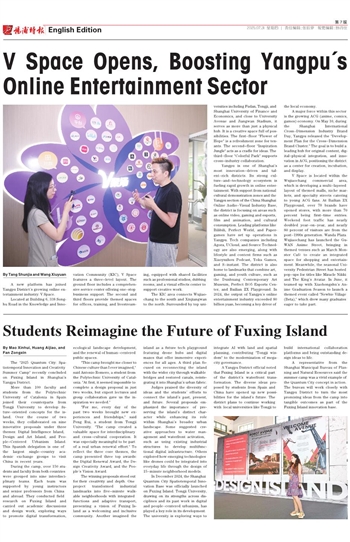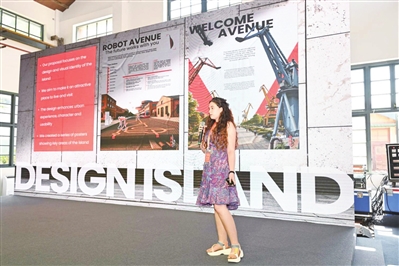By Mao Xinhui, Huang Aijiao, and Fan Zongxin
The "2025 Quantum City: Spatiotemporal Innovation and Creativity Summer Camp" recently concluded on Fuxing Island in Shanghai's Yangpu District.
More than 100 faculty and students from the Polytechnic University of Catalonia in Spain joined their counterparts from Tongji University to develop future-oriented concepts for the island. Over the course of two weeks, they collaborated on nine innovative proposals under three themes: Digital Intelligence Island, Design and Art Island, and People-Centered Urbanism Island. This Spanish delegation is one of the largest single-country academic exchange groups to visit China in recent years.
During the camp, over 150 students and faculty from both countries were grouped into nine interdisciplinary teams. Each team was supported by young instructors and senior professors from China and abroad. They conducted field research on Fuxing Island and carried out academic discussions and design work, exploring ways to promote digital transformation, ecological landscape development, and the renewal of human-centered public spaces.
"This camp brought me closer to Chinese culture than I ever imagined," said Antonio Romero, a student from the Polytechnic University of Catalonia. "At first, it seemed impossible to complete a design proposal in just two weeks, but expert lectures and group collaboration gave us the inspiration we needed."
"For me, every day of the past two weeks brought new experiences and friendships," said Peng Rui, a student from Tongji University. "The camp created a valuable space for interdisciplinary and cross-cultural cooperation. It was especially meaningful to be part of a real urban renewal effort." To reflect the three core themes, the camp presented three top awards: the Digital Renewal Award, the Design Creativity Award, and the People's Vision Award.
The winning proposals stood out for their creativity and depth. One project transformed industrial landmarks into five-minute walkable neighborhoods with integrated functions and adaptive transport, presenting a vision of Fuxing Island as a welcoming and inclusive community. Another imagined the island as a future tech playground featuring drone hubs and digital mazes that offer immersive experiences for all ages. A third plan focused on reconnecting the island with the wider city through walkable bridges and restored canals, reintegrating it into Shanghai's urban fabric.
Judges praised the diversity of ideas and the students' efforts to connect the island's past, present, and future. Several proposals emphasized the importance of preserving the island's distinct character while enhancing its role within Shanghai's broader urban landscape. Some suggested creative approaches to water management and waterfront activation, such as using existing industrial structures to develop multifunctional digital infrastructure. Others explored how emerging technologies like drones could be integrated into everyday life through the design of 15-minute neighborhood models.
In December 2024, the Shanghai Quantum City Spatiotemporal Innovation Base was officially launched on Fuxing Island. Tongji University, drawing on its strengths across disciplines and its past work in digital and people-centered urbanism, has played a key role in its development. The university is exploring ways to integrate AI with land and spatial planning, contributing "Tongji wisdom" to the modernization of megacity governance.
A Yangpu District official noted that Fuxing Island is a critical part of the district's waterfront transformation. The diverse ideas proposed by students from Spain and China have opened up new possibilities for the island's future. The district plans to continue working with local universities like Tongji to build international collaboration platforms and bring outstanding design ideas to life.
A representative from the Shanghai Municipal Bureau of Planning and Natural Resources said the summer camp was a vivid example of the Quantum City concept in action. The bureau will work closely with Yangpu District to turn the most promising ideas from the camp into tangible outcomes as part of the Fuxing Island innovation base.


